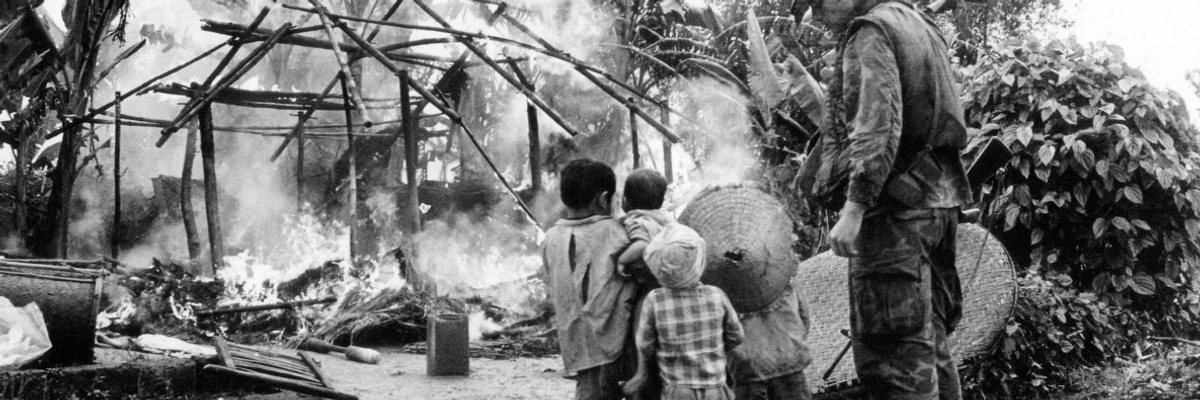
U.S. Marine stands with Vietnamese children as they watch their house burn after a patrol set it ablaze after finding AK-47 ammunition, Jan. 13, 1971, 25 miles south of Da Nang. (Photo: HJ/AP)
The Ken Burns Vietnam War Documentary Glosses Over Devastating Civilian Toll
While most American soldiers approximately 12 months serving in Vietnam, the civilians of that nation lived the war week after week, month after month, year after year, from one decade into the next.
"I think that when Americans talk about the Vietnam War ... we tend to talk only about ourselves. But if we really want to understand it ... or try to answer the fundamental question, 'What happened?' You've got to triangulate," says filmmaker Ken Burns of his celebrated PBS documentary series "The Vietnam War." "You've got to know what's going on. And we have many battles in which you've got South Vietnamese soldiers and American advisors or ... their counterparts and Vietcong or North Vietnamese. You have to get in there and understand what they're thinking."
"War is not combat, though combat is a part of war."
Burns and his co-director Lynn Novick spent 10 years on "The Vietnam War," assisted by their producer Sarah Botstein, writer Geoffrey Ward, 24 advisors, and others. They assembled 25,000 photographs, feature close to 80 interviews of Americans and Vietnamese, and spent $30 million on the project. The resulting 18-hour series is a marvel of storytelling, something in which Burns and Novick take obvious pride. "The Vietnam War" provides lots of great vintage film footage, stunning photos, a solid Age of Aquarius soundtrack, and plenty of striking soundbites. Maybe this is what Burns means by triangulation. The series seems expertly crafted to appeal to the widest possible American audience. But as far as telling us "what happened," I don't see much evidence of that.
Like Burns and Novick, I also spent a decade working on a Vietnam War epic, though carried out on a far more modest budget, a book titled "Kill Anything That Moves." Like Burns and Novick, I spoke with military men and women, Americans and Vietnamese. Like Burns and Novick, I thought I could learn "what happened" from them. It took me years to realize that I was dead wrong. That might be why I find "The Vietnam War" and its seemingly endless parade of soldier and guerrilla talking heads so painful to watch.
War is not combat, though combat is a part of war. Combatants are not the main participants in modern war. Modern war affects civilians far more and far longer than combatants. Most American soldiers and Marines spent 12 or 13 months, respectively, serving in Vietnam. Vietnamese from what was once South Vietnam, in provinces like Quang Nam, Quang Ngai, Binh Dinh, as well as those of the Mekong Delta - rural population centers that were also hotbeds of the revolution -- lived the war week after week, month after month, year after year, from one decade into the next. Burns and Novick seem to have mostly missed these people, missed their stories, and, consequently, missed the dark heart of the conflict.
Read the full article at The Intercept.
An Urgent Message From Our Co-Founder
Dear Common Dreams reader, The U.S. is on a fast track to authoritarianism like nothing I've ever seen. Meanwhile, corporate news outlets are utterly capitulating to Trump, twisting their coverage to avoid drawing his ire while lining up to stuff cash in his pockets. That's why I believe that Common Dreams is doing the best and most consequential reporting that we've ever done. Our small but mighty team is a progressive reporting powerhouse, covering the news every day that the corporate media never will. Our mission has always been simple: To inform. To inspire. And to ignite change for the common good. Now here's the key piece that I want all our readers to understand: None of this would be possible without your financial support. That's not just some fundraising cliche. It's the absolute and literal truth. We don't accept corporate advertising and never will. We don't have a paywall because we don't think people should be blocked from critical news based on their ability to pay. Everything we do is funded by the donations of readers like you. Will you donate now to help power the nonprofit, independent reporting of Common Dreams? Thank you for being a vital member of our community. Together, we can keep independent journalism alive when it’s needed most. - Craig Brown, Co-founder |
"I think that when Americans talk about the Vietnam War ... we tend to talk only about ourselves. But if we really want to understand it ... or try to answer the fundamental question, 'What happened?' You've got to triangulate," says filmmaker Ken Burns of his celebrated PBS documentary series "The Vietnam War." "You've got to know what's going on. And we have many battles in which you've got South Vietnamese soldiers and American advisors or ... their counterparts and Vietcong or North Vietnamese. You have to get in there and understand what they're thinking."
"War is not combat, though combat is a part of war."
Burns and his co-director Lynn Novick spent 10 years on "The Vietnam War," assisted by their producer Sarah Botstein, writer Geoffrey Ward, 24 advisors, and others. They assembled 25,000 photographs, feature close to 80 interviews of Americans and Vietnamese, and spent $30 million on the project. The resulting 18-hour series is a marvel of storytelling, something in which Burns and Novick take obvious pride. "The Vietnam War" provides lots of great vintage film footage, stunning photos, a solid Age of Aquarius soundtrack, and plenty of striking soundbites. Maybe this is what Burns means by triangulation. The series seems expertly crafted to appeal to the widest possible American audience. But as far as telling us "what happened," I don't see much evidence of that.
Like Burns and Novick, I also spent a decade working on a Vietnam War epic, though carried out on a far more modest budget, a book titled "Kill Anything That Moves." Like Burns and Novick, I spoke with military men and women, Americans and Vietnamese. Like Burns and Novick, I thought I could learn "what happened" from them. It took me years to realize that I was dead wrong. That might be why I find "The Vietnam War" and its seemingly endless parade of soldier and guerrilla talking heads so painful to watch.
War is not combat, though combat is a part of war. Combatants are not the main participants in modern war. Modern war affects civilians far more and far longer than combatants. Most American soldiers and Marines spent 12 or 13 months, respectively, serving in Vietnam. Vietnamese from what was once South Vietnam, in provinces like Quang Nam, Quang Ngai, Binh Dinh, as well as those of the Mekong Delta - rural population centers that were also hotbeds of the revolution -- lived the war week after week, month after month, year after year, from one decade into the next. Burns and Novick seem to have mostly missed these people, missed their stories, and, consequently, missed the dark heart of the conflict.
Read the full article at The Intercept.
"I think that when Americans talk about the Vietnam War ... we tend to talk only about ourselves. But if we really want to understand it ... or try to answer the fundamental question, 'What happened?' You've got to triangulate," says filmmaker Ken Burns of his celebrated PBS documentary series "The Vietnam War." "You've got to know what's going on. And we have many battles in which you've got South Vietnamese soldiers and American advisors or ... their counterparts and Vietcong or North Vietnamese. You have to get in there and understand what they're thinking."
"War is not combat, though combat is a part of war."
Burns and his co-director Lynn Novick spent 10 years on "The Vietnam War," assisted by their producer Sarah Botstein, writer Geoffrey Ward, 24 advisors, and others. They assembled 25,000 photographs, feature close to 80 interviews of Americans and Vietnamese, and spent $30 million on the project. The resulting 18-hour series is a marvel of storytelling, something in which Burns and Novick take obvious pride. "The Vietnam War" provides lots of great vintage film footage, stunning photos, a solid Age of Aquarius soundtrack, and plenty of striking soundbites. Maybe this is what Burns means by triangulation. The series seems expertly crafted to appeal to the widest possible American audience. But as far as telling us "what happened," I don't see much evidence of that.
Like Burns and Novick, I also spent a decade working on a Vietnam War epic, though carried out on a far more modest budget, a book titled "Kill Anything That Moves." Like Burns and Novick, I spoke with military men and women, Americans and Vietnamese. Like Burns and Novick, I thought I could learn "what happened" from them. It took me years to realize that I was dead wrong. That might be why I find "The Vietnam War" and its seemingly endless parade of soldier and guerrilla talking heads so painful to watch.
War is not combat, though combat is a part of war. Combatants are not the main participants in modern war. Modern war affects civilians far more and far longer than combatants. Most American soldiers and Marines spent 12 or 13 months, respectively, serving in Vietnam. Vietnamese from what was once South Vietnam, in provinces like Quang Nam, Quang Ngai, Binh Dinh, as well as those of the Mekong Delta - rural population centers that were also hotbeds of the revolution -- lived the war week after week, month after month, year after year, from one decade into the next. Burns and Novick seem to have mostly missed these people, missed their stories, and, consequently, missed the dark heart of the conflict.
Read the full article at The Intercept.

